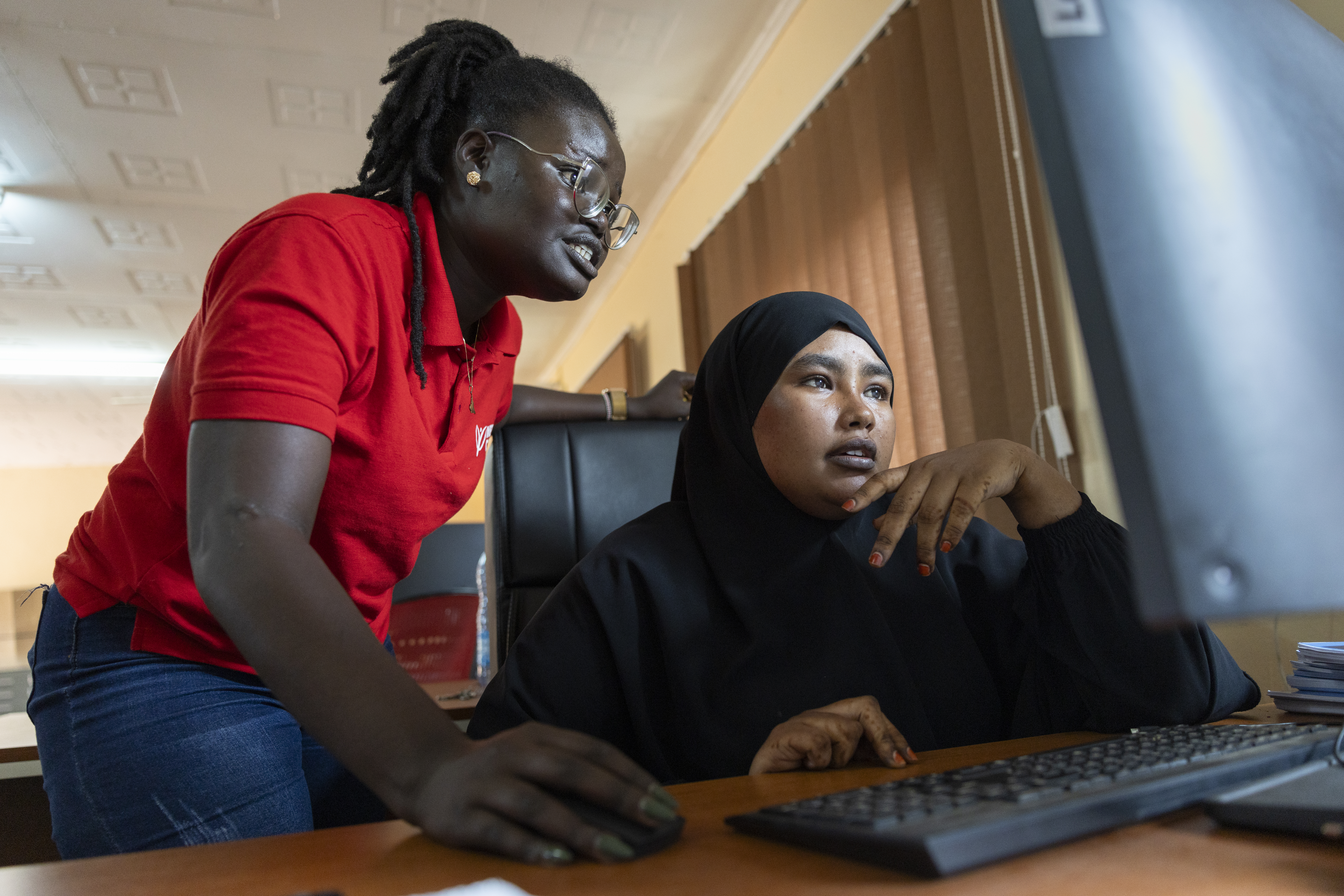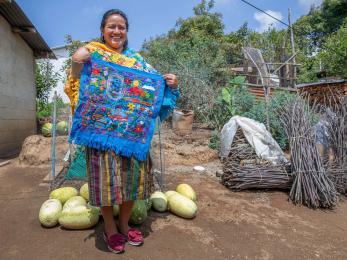A humanitarian life born from displacement

When she first set off on her career path, Odette planned on being a teacher.
After spending a number of years teaching secondary school, Odette wanted a change and subsequently changed careers — from education to working in the humanitarian sector.
She embarked on a brand new career path and has spent the past 12 years working for humanitarian aid groups. She's been with Mercy Corps for two years now.
As the director of the communications team in the Democratic Republic of Congo (DRC), Odette travels to different field team bases where Mercy Corps is working to get documentation and gather information on people's activities.
Two decades of ongoing conflict in the Eastern region has resulted in large numbers of people being forced to flee their homes, leaving everything behind as they seek safety and basic necessities like food and water.
"And this situation puts people in a situation in which they lack almost everything because most of the time when they flee, they flee with almost nothing," Odette says.
The needs of displaced people are not a far-removed issue for Odette. Just over 20 years ago, she was in the same situation as the people she now spends her days helping.
Losing everything to displacement
In 1996, during what is now referred to as the First Congo War, Odette had to flee her home to escape an attack on her hometown. The war eventually ended, Odette returned to her home in Bukavu and eventually moved to Goma.
Four years after she first had to flee her home, disaster and displacement struck again. This time, in the form of a volcano.
Even now, people in the DRC are fleeing their homes and leaving everything behind. Displacement rates are high. As of August 2018, more than 4.5 million people were displaced. As a result, the DRC is facing the largest displacement crisis in all of Africa.
On average, whether from violence or a natural disaster, someone living in the DRC will be displaced five times in their life.
Odette was about to be displaced for the second time.
When the volcano erupted, she underestimated the severity of the disaster, but after her children ran to her saying they had to leave, they did. Leaving her home, belongings and almost everything else behind, Odette, her children and her elderly mother were displaced once more.
"And that's [why] we left, without taking anything precious, we just took our school certificates and children's certificates," she says. "The volcano had already started bringing smoke and ashes and so we had to leave that place."
It wasn't until they got to a mountain in Rwanda that Odette could see just how much damage the volcano had done to her town. Now, they were refugees.
Without any kind of shelter, Odette and her children spent the next day taking refuge under a tree. Odette called neighbours and friends who were going back to Goma to assess the damage. That's when she learned her home — along with all of her and her family's belongings — were gone.
"...that's when we learned that our house had been destroyed by the lava," Odette says.
In that moment, it all became clear for her just what being displaced truly meant.
"And that's when we realised we had lost all, it was only our life that we were able to save. And that's when we learned what it was like to be hungry because we had nothing, we had nothing to eat," Odette says.
"And that is when I understood when people who are fleeing say they have nothing; it has helped me to understand what they mean."
"A united world is possible"

From this personal experience, Odette found her passion for helping others, specifically those who are displaced by emergencies. She knows what countless displaced people across the country and across the world are going through.
"And this situation ... reminds me of my past, my past life, my past experiences," Odette says.
Since beginning a new career path after leaving education, Odette has been assisting those who are standing in the shoes she once stood in herself.
When she's not working with Mercy Corps, Odette spends her time cooking, or with her children and friends. Her humanitarian values shine through, even outside of the office, where Odette surrounds herself with people who have the same ideals and hopes as she does — people who also "believe that a united world is possible."
Odette and her friends have exercises they do at the local community centre. Their focus is to promote togetherness and live peacefully despite their differences. Even the neighbourhood children are involved.
"We start with little ones, even up to small children where they are playing football and we show them how they can forgive the other and how they can play together, play with each other," Odette says.
Odette remembers a different DRC than the one she lives in today. A peaceful, stable country where people could build a home and live for a long period of time without fear of displacement.
"When there was peace we could keep friends for five or seven years and all studying in the same place without having to move," Odette says. "Peace to me gave us the opportunity to study, to live and even to move, because I remember we could travel even in the nights."
This is the version of the DRC that Odette wants to see in the future. She wants peace.
"My dream ... is to see the whole country having peace. And what it means for me to have peace is for people to live where they want to live," Odette says. "Peace to me is for people to ... not have to be forced every time to flee, leaving their family, their friends and all what they have."


